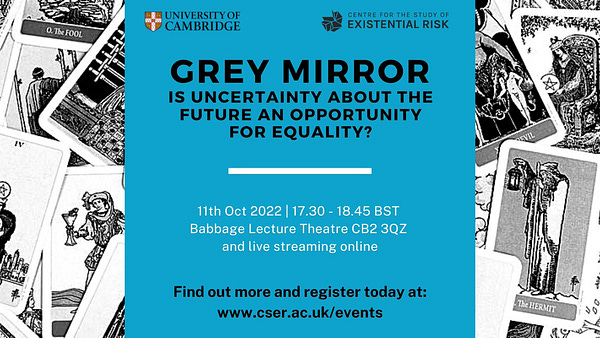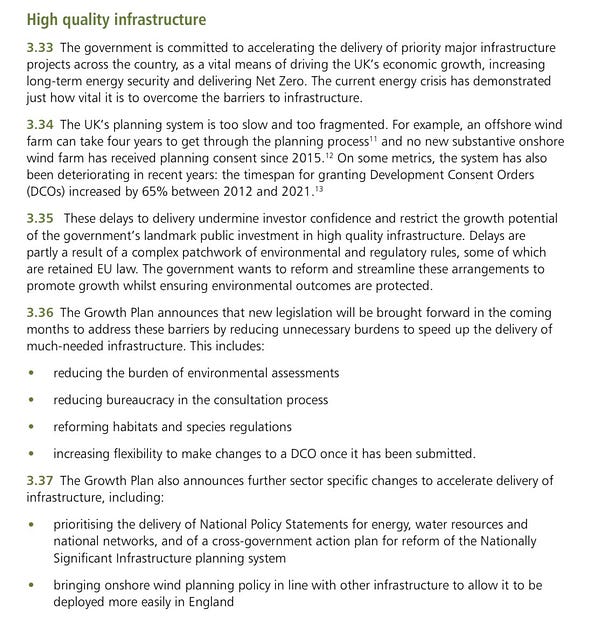Grey Mirrors, Uncertainty as Opportunity
Existential risk, the stories we tell ourselves. UK infrastructure planning, UK budget positive? My unconference session on governance mechanisms. Theatre coming up: Totoro, You’re Safe Til 2024.
I lost my voice most of this week! Too much conferencing. This week:
Existential risk, the stories we tell ourselves: CSER Panel I’m speaking on
A note on my unconference session on governance mechanisms
Citizen’s Panel on energy decarbonisation
Protests in Iran (women)
Is AI existential risk deluded, if you think so: enter prize!
UK infrastructure planning, UK budget positive?
Theatre coming up: Totoro, You’re Safe Til 2024
Links: Against open plan offices, UK opinion polls; colonial administration in India; US inflation thoughts: Free is not free on the internet; Increasing US book bans; Founders with ADHD.
I’m on a panel 11 October about the future.
Grey Mirrors – uncertainty about the future is an opportunity for more people to write it. I am doing this panel moderated by Jessica Bland, after Aarathi Krishnan’s lecture, and with Genevieve Lively.
“The future is a grey mirror of our present. Uncertainty about what happens next means the future is never available in high definition. This makes it important to consider a wide range of potential futures in case any of them come true. But that’s not as fun as sitting back and enjoying the vivid future painted by a Black Mirror episode on TV.
What does it mean to intentionally make futures that don’t just come from a few people’s imaginations? How can more inclusive activities about the future lead to fairer decisions in the present? What are the risks this poses, what fault lines might it open up, if this isn’t taken into consideration?...”


As close readers may have picked up, I am very interested in the impacts we have on the system and the myths and stories we tell ourselves. I am interested in the strength of “personal agency” and how we both influence the system, as well as the system influencing us.
These range from understanding how the quakers, and minority advocates changed people’s minds on slavery, through women’s rights and votes, to disability rights etc.
It’s relevant for thinking about climate today. It’s relevant for all forms of creativity now. It’s relevant for policy makers and even economic thinking in terms of how they are both part of the system and influence it. We mentioned this in my podcast with economist Diane Coyle, and you can see this in her work as well.
Standard economic theory and policy making uses cost-benefit analysis or utility theory in some way to derive where to set policy. They might take surveys. Mostly they don’t involve people and communities directly into shaping policy. This is what citizen’s assemblies and panels do (see below).
But also think of the stories and myths we tell ourselves:
All people are made equal; or curing a slave is worth 2 hekels, but curing a pleb is worth 5 shekels (written as law in the law code of Hammurabi)
Women shouldn't vote; women must vote.
Nothing about us, without us | We know what’s best for disabled people.
The stories and models we advocate and use influence the system (in economics this ranges from Keynes, to “trickle-down” to supply-side etc.) In humanities, it’s the stories we tell ourselves:
Techno-optimism or doomerism
Abundance or degrowth
Freedom or censorship
And all the ranges in between.
Vivid images of the future travel far and wide. Black Mirror’s dystopias have become a Netflix phenomenon. But the actual details of the future are not available in high definition. The future is uncertain - a pale grey mirror of our present. Some parameters are defined, but the unknowns in between open up space for speculation on a range of different futures. This talk and responses will cover how that grey is an opportunity for more people to bring their ideas about the future to global decision-making tables. The future is shaped by the present but not But what does it mean to do this future-making so that it lets more visions in? Is there a trade-off with the mass media influence that comes with presenting a vivid future? How can more inclusive activities about the future lead to fairer decisions in the present?
The lecture is online or in person, details here. And if this is really your thing there is also a dinner in Cambridge, so let me know.
Notes from the UnConference.
Notes from the UnConference. I’ve written up my notes from the UnConference on governance mechanisms and democratic and other representative voting systems. It’s in note format so not a whole blog worth yet but you can see them here. The summary is:
We discussed:
Open Space
Quadratic Voting
Polis
Citizen Assemblies / Juries
Learning from countries Taiwan, Ireland, Switzerland; also Singapore, China
Arrows impossibility theorem
“Representative democracy” and problems of disinformation
Company, proxy voting; institutional decision-making
Idea: that 4 adjacent systems of idea generation and decision making, namely: (1) Open Space Technology (2) Quadratic Voting (3) Polis and (4) Citizen Assemblies /Juries have the ability to unlock decision making processes that are currently log jammed.
We have proved use cases led by the work of Audrey Tang (Digital Minister) in Taiwan, and other examples such as Ireland on abortion laws.
Debate: at what level does this work? Nation-state? City State? 20m people? Also fewer.
Debate: If there is dis-information or lack of information can we trust people to vote well?
Debate: How much democracy do we have/need?
Debate/Info: Citizen’s assemblies
Debate: How involves should shareholders be on company voting?
Citizen’s Panel on energy decarbonisation
Citizen’s Panel on energy decarbonisation. Following on from thinking on involving the community. The UK Climate Change Committee worked with a Citizen’s Panel to inform decarbonisation policy.


The CCC collaborated with Lancaster University on a deliberative policy design process, convening a citizens’ panel on home energy decarbonisation – bringing together 24 homeowners to explore policies for dealing with the challenge of retrofitting homes with efficiency measures and low-carbon heating.
This is another way of informing policy that has experts involved and doesn’t rely necessarily on expected value calculations.
Unconference sessions. There were five sessions. These are the titles from the first session, as examples:
AI x-risk
Will upcoming Minsky moment be chronic or acute?
Are Shareholders taking their shareholder rights seriously?
Is exposure/transparency of shareholder voting enough for change?
Changing world in our day jobs
Channeling investment into sustainable companies and initiatives
How can sport and football tackle climate change?
How can we think differently and break down barriers between private investment, public finance and philanthropy?
Radical listening and transparency in philanthropy through blockchain technology
Creating currency to value nature
System acceleration or building new global structures
What are the bounds of personal responsibilities to the planet?
Market based solutions and are they really sustainable
Waste - intentional circular systems
LMK if you’d like all the title sessions.
UK infrastructure planning, a UK budget positive? I’m avoiding talking too much about the Current Thing. But everything in the UK has exploded around the recent not-mini-budget.
I am only going to pull out one item related to “supply-side regulatory reform” ideas, as this might be positive for renewable infrastructure. There is a lot of marginal land in the UK. There are also difficult trade-offs between local rural communities and, eg, wind-farm developments.


Will wait and see what legislation might bring, but if permitting becomes easier then it will be a positive for energy and net-zero ambitions, even if it might upset rural and other communities.
Is AI existential risk deluded, if you think so: enter prize! I hear push back on AI x-risk. If you are sure then enter this prize competition.


Theatre coming up: Totoro, You’re Safe Til 2024.
Theatre has re-emerged - at least in London and I think broadly the UK. The number of shows in 2022 has slowly risen to pre-pandemic levels (though I hear this second hand) even if working conditions have not improved and number of people leaving the sector has seemingly increased.
I will be going to see David Finnigan at the Barbican next week, on Oct 1 - let me know if you might be about. I am also seeing Totoro on Oct 15, also at the Barbican and Improbable: Musical (improv musical!) on Oct 21, Hackney Empire. Shout if you might be coming.
I’m also giving a shout-out to Asian diaspora theatre makers. This piece re-examines a dark episode in Korea and the conflict with Japan and also questions the value of re-examination.


There is a quote. “Human rights mean nothing when you’re starving”.
This is something I talk to economic historian Mark Koyama about in a forthcoming podcast.
Links:
Protests in Iran (women). Maybe one day there will be another revolution. But elsewhere in the world, big things are happening.

The evidence seems to be against open plan offices. Maybe these are some of the returns to remote working.


Looking at UK opinion polls


A podcast from the archive:



Some claims to benefits (?) to colonial administration in India

US inflation thoughts


Free is not free on the internet.


Increasing US book bans
Founders with ADHD









I really enjoyed that segment of your conversation with Aella. It was perhaps the best first person account of the benefits of home schooling and alternative education and the drawbacks of traditional schooling systems I have ever heard. Immediately after the portion you excerpt here she went on to discuss the challenges she had after school and how she was essentially unemployable, not the least because she was completely unsocialized with any peer group. So again, she articulated as well as anyone the social benefits of participating in a traditional schooling environment, and the critical importance of socialization as much or even maybe more than simply learning to read, write, and math in the education of a child.